In a groundbreaking development, the partnership between Acclaim Autism and Appian has achieved a dramatic reduction in the waiting time for autism treatment. This innovative collaboration signifies a transformative shift in autism care, emphasizing the significance of early intervention for children diagnosed with the condition. Traditionally, families navigating the convoluted bureaucratic systems faced delays extending up to six months before they could access desperately needed treatment. The integration of artificial intelligence and process automation in this partnership has remarkably shortened the waiting period, enabling families to begin essential behavioral therapies in as little as one month. This advancement not only underscores the potential of technology in healthcare but also highlights the critical role of timing in developmental therapies.
The Challenge of Timely Intervention
Autism diagnoses impose immense challenges on families, as the journey from diagnosis to treatment often involves navigating complex administrative systems. These delays are especially detrimental given that early intervention is pivotal for children’s development, aiding in the enhancement of social communication, language, and adaptive skills. The previous system shackled families in layers of paperwork, rendering them unable to start effective therapies promptly. The labyrinth of regulatory requirements, including a mix of federal healthcare laws, insurance protocols, and specific industry rules, exacerbated these delays. Jamie Turner, President of Acclaim Autism, articulated the situation’s gravity, noting that the magnitude of forms, insurance authorizations, and medical record requisitions imposed a cumbersome burden on families. The struggle to comply with an intricate web of regulations posed significant barriers, stalling the initiation of treatment and wasting critical developmental months for children who could have been benefiting from timely therapies.
The complexity and inefficiency of these administrative processes underscore the pressing need for a solution that streamlines access to care. Parents, already coping with the emotional challenges of an autism diagnosis, found themselves entangled in bureaucratic red tape. Rather than focusing on providing vital support for their children, they were left navigating procedural mazes. Within this fraught context, the introduction of technology becomes a beacon of hope, offering a potential pathway to transform these arduous processes and ensure children receive the timely support they need. This restructuring is especially relevant as the benefits of early intervention extend far beyond the administrative realm, promising enhanced developmental outcomes and a more efficient healthcare experience for families.
Embracing Technological Solutions
Artificial Intelligence (AI) has emerged as a pivotal tool in overcoming systematic barriers, offering efficient and revolutionary methods for streamlining healthcare processes. Acclaim Autism’s collaboration with Appian exemplifies how AI can be harnessed to map complex workflows and identify bottlenecks that impede progress. By integrating AI into handling clinical autism documents, Acclaim Autism has navigated the intricate landscape of regulatory compliance, most notably with HIPAA standards, which safeguard sensitive patient information. This technological innovation has revolutionized the extraction of diagnostic data from numerous unstructured medical records, transforming it into a user-friendly format for care teams. With a remarkable accuracy rate of 99 percent, AI has replaced the labor-intensive manual processing, eliminating potential errors and delays in data extraction.
Additionally, the deployment of Robotic Process Automation (RPA) further enhances the efficiency of data management. RPA systems have streamlined the extraction of information from electronic health records, automatically inputting it into relevant systems, which significantly cuts down processing time. This transition results in fewer errors—previously reaching 20 percent—and illustrates a broader healthcare trend where technology is employed to enhance precision and operational efficiency. Through the adoption of AI and RPA, Acclaim Autism has dramatically reduced administrative burdens, accelerating access to treatment and allowing healthcare providers to allocate more resources to direct patient care, ultimately leading to improved patient outcomes.
The Impact on Child Development
Accelerating the initiation of therapies by as much as five months presents a significant advantage for children diagnosed with autism, as they gain enhanced opportunities to meet critical developmental milestones. Early intervention is not merely an administrative goal but a vital necessity that holds the power to positively influence a child’s entire developmental trajectory. When therapies begin sooner, children are better positioned to develop crucial capabilities, including language skills, social interactions, and adaptive behaviors. The overarching aim of these technological advancements transcends mere efficiency metrics; the focus is squarely on improving the quality of life for children with autism. By facilitating early intervention, technology helps ensure that children can partake in fundamental “human moments,” such as speaking their first words or participating in family activities.
These moments, seemingly simple, are significant achievements for children on the autism spectrum and underline the profound impact of timely intervention. The integration of sophisticated technology in the healthcare process exemplifies the innovative approaches needed to foster these milestone moments. It highlights how technology can break through barriers that previously hindered access to early treatment, opening doors to better developmental pathways and enriched life experiences for children with autism. This paradigm shift reiterates the essential role of AI in reshaping healthcare, ensuring that therapeutic interventions are not delayed by administrative hurdles, thereby nurturing a more supportive environment for children to thrive.
Enhancing Staff Engagement
Beyond the immediate benefits to families and patients, the technological innovations undertaken by Acclaim Autism have had a significant impact on employee experience. The reduction of administrative workload through AI and RPA has afforded staff the opportunity to focus more intensely on their primary mission of aiding children directly. This shift has been instrumental in addressing one of the most pressing challenges facing the healthcare sector: high turnover rates driven by burnout and administrative burdens. By streamlining processes and reducing the complexities of their workloads, Acclaim Autism has succeeded in fostering an environment where employees feel more engaged and less stressed. This has positively influenced staff morale, leading to better retention and job satisfaction.
The ability to focus on direct patient interaction, rather than being bogged down by cumbersome paperwork, enhances the efficacy of autism care delivery. It allows staff to deploy their expertise where it matters most—in addressing the individual needs of each child. Moreover, by alleviating procedural delays, Acclaim Autism is nurturing a more dynamic and responsive work environment. This not only improves the quality of services provided but also ensures a sustainable work model where employees are motivated and supported. As a result, the organization is better equipped to offer a high standard of care, further underscoring the transformative power of integrating technology in healthcare operations.
Future Innovations and Broader Implications
Families dealing with autism diagnoses face daunting challenges, largely due to complex administrative barriers that delay treatment, critical for early childhood development. Effective therapies enhance social communication, language, and adaptive skills, but paperwork and regulatory requirements prevent prompt treatment initiation. Layers of federal healthcare laws, insurance protocols, and industry-specific rules further stall progress. Jamie Turner, President of Acclaim Autism, highlights the overwhelming burden of forms, insurance authorizations, and medical record requisitions as significant barriers for families, wasting vital developmental months. Parents, already grappling with emotional aspects of diagnosis, find themselves caught in bureaucratic red tape instead of focusing on their children’s needs. The introduction of technology offers hope, potentially streamlining processes and ensuring timely access to care. This shift could enhance developmental outcomes and make healthcare more efficient, allowing families a smoother, more supportive experience during crucial formative years.









